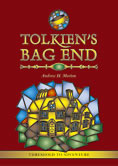tolkien's Bag End by Andrew H. Morton (01.07.09 by Pieter Collier) - Comments
For those interested in more background about the author and his previous book you can read an interview with him here.
In Tolkien’s Bag End, Andrew Morton sets out to uncover the significance of the Worcestershire manor house that famously gave its name to the home of Bilbo and Frodo Baggins in The Hobbit and The Lord of the Rings. During the 1920s, when J.R.R. Tolkien was beginning to formulate the stories that found their way into The Hobbit, Bag End was owned and farmed by his influential aunt Jane Neave.
Tolkien’s Bag End features several previously unpublished photographs of the real Bag End from this period along with other interesting images from local archives. The book delves into the history of the Dormston farm, considers the influence of Tolkien’s Worcestershire family background and speculates on the origin and meaning of the name Bag End. With the help of a detailed knowledge of the building and its Worcestershire setting, the author argues that there are aspects of the real Bag End that may well have found their way into Tolkien’s fictional location.
Tolkien’s Bag End makes an interesting companion to Andrew Morton’s previous book Tolkien’s Gedling 1914, as both books set out to investigate previously unexplored aspects of J.R.R. Tolkien’s earlier life and influences.
Type: Paperback
Extent: 88 pages
Publisher: Brewin Books
Publication date: June 22, 2009
Language: English
ISBN-10: 1858584558
ISBN-13: 978-1858584553
Spread the news about this J.R.R. Tolkien article:
